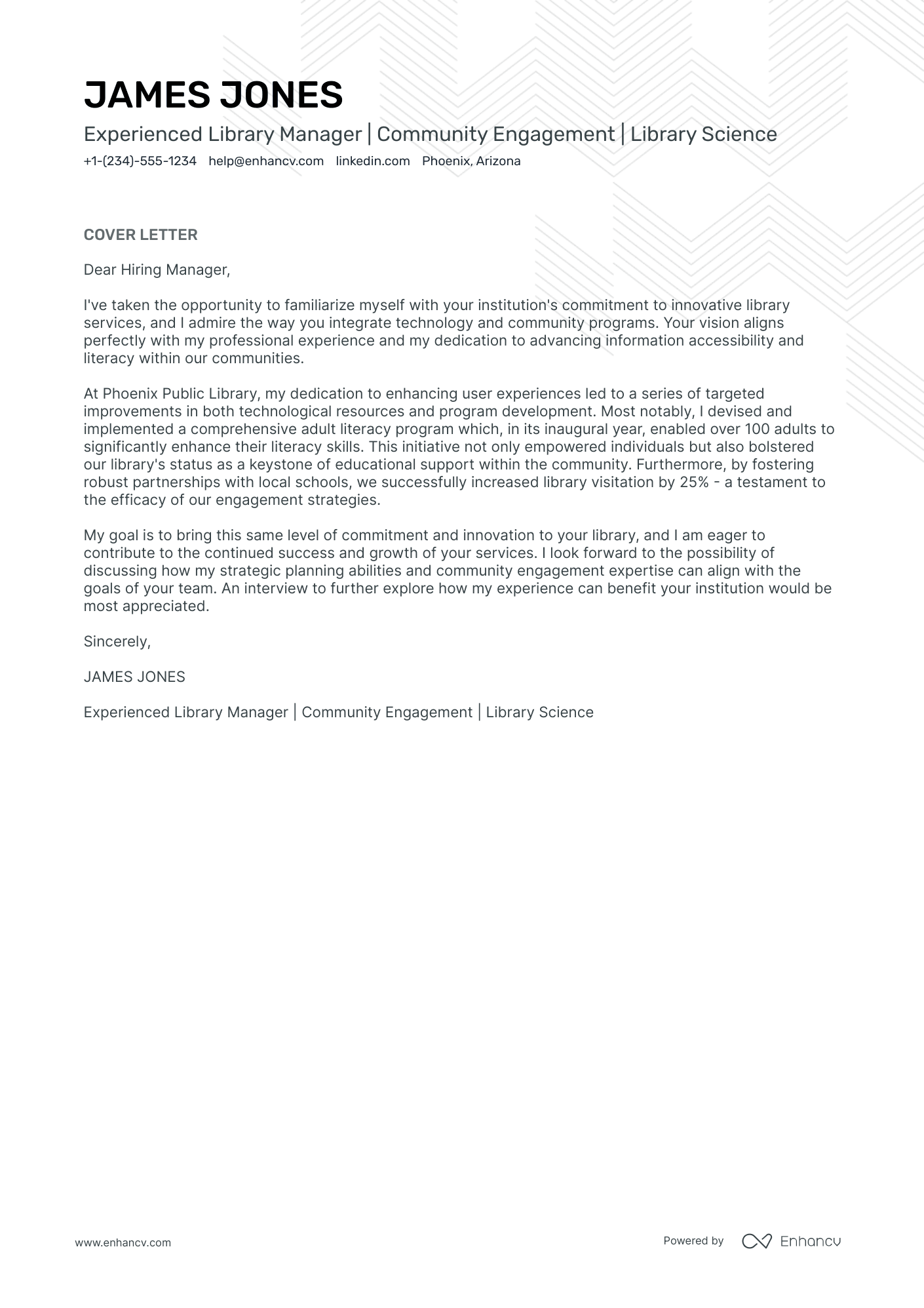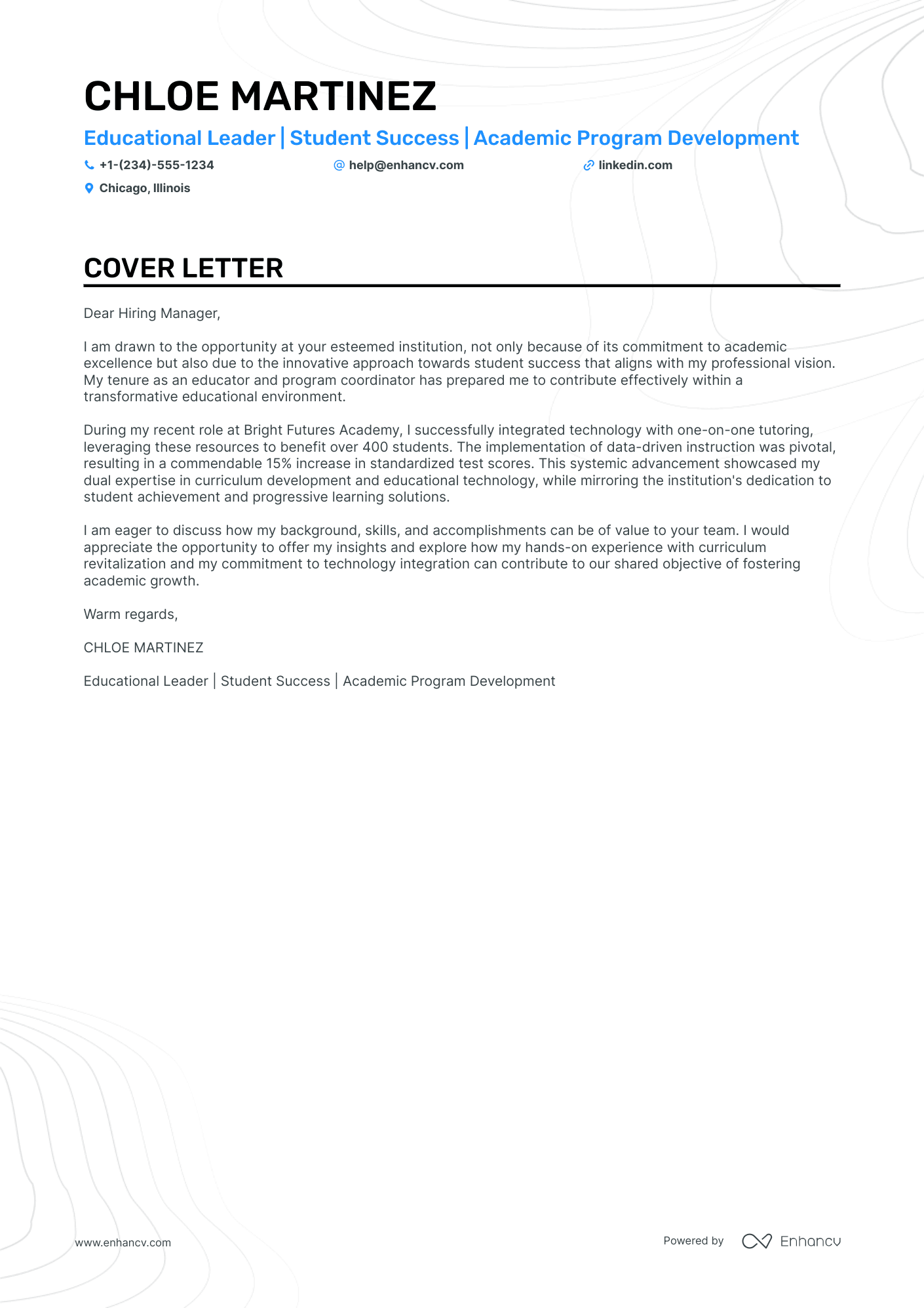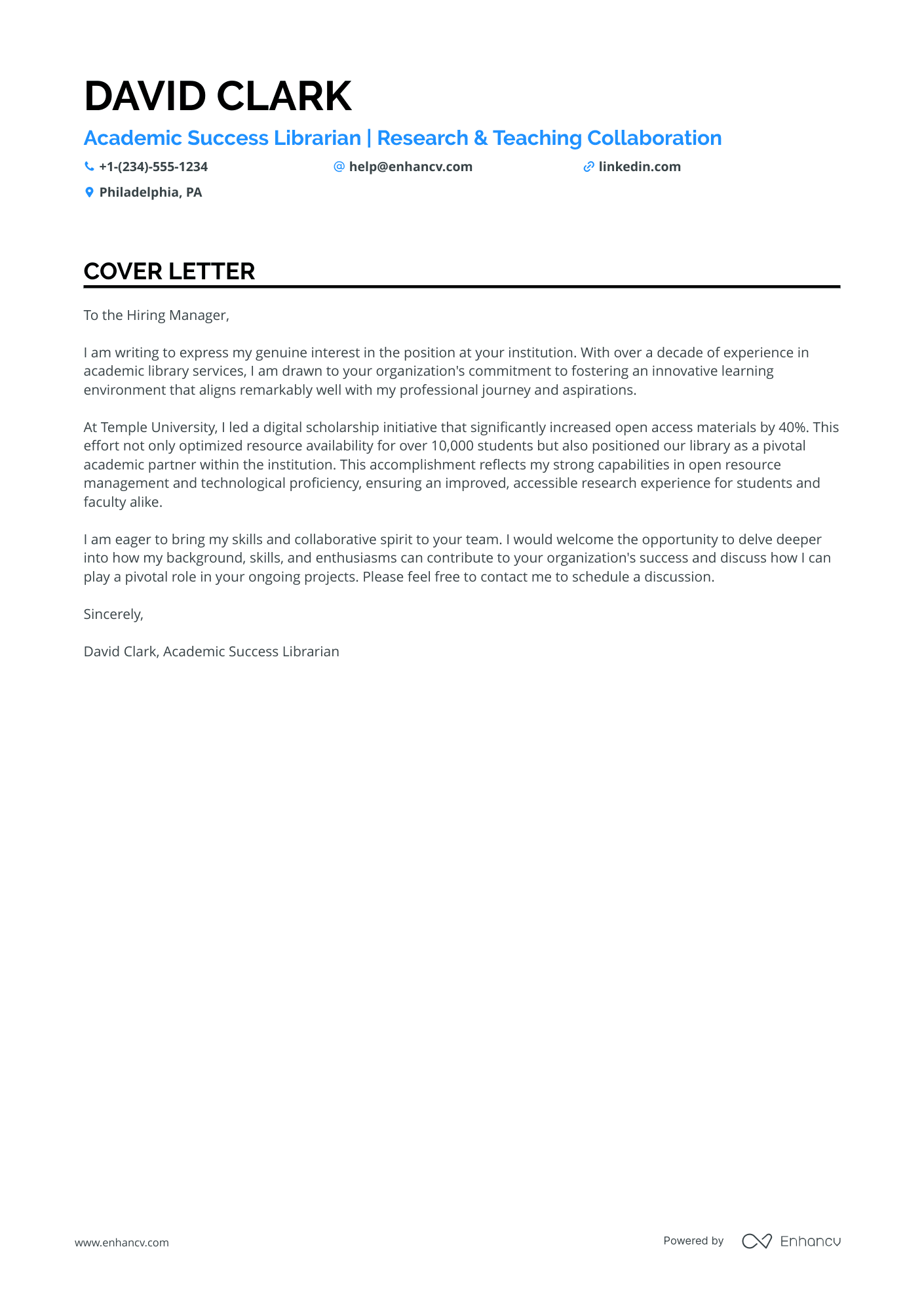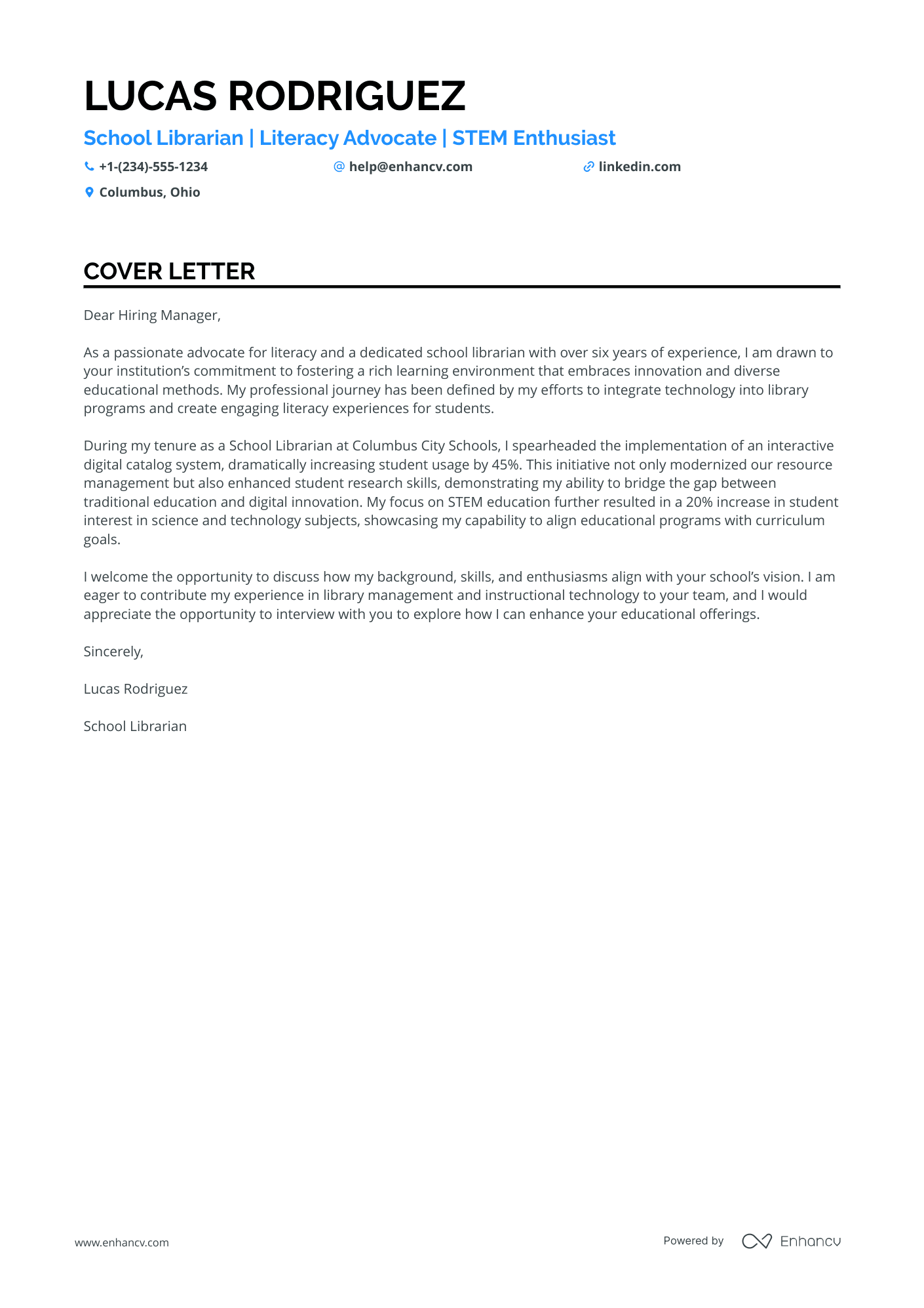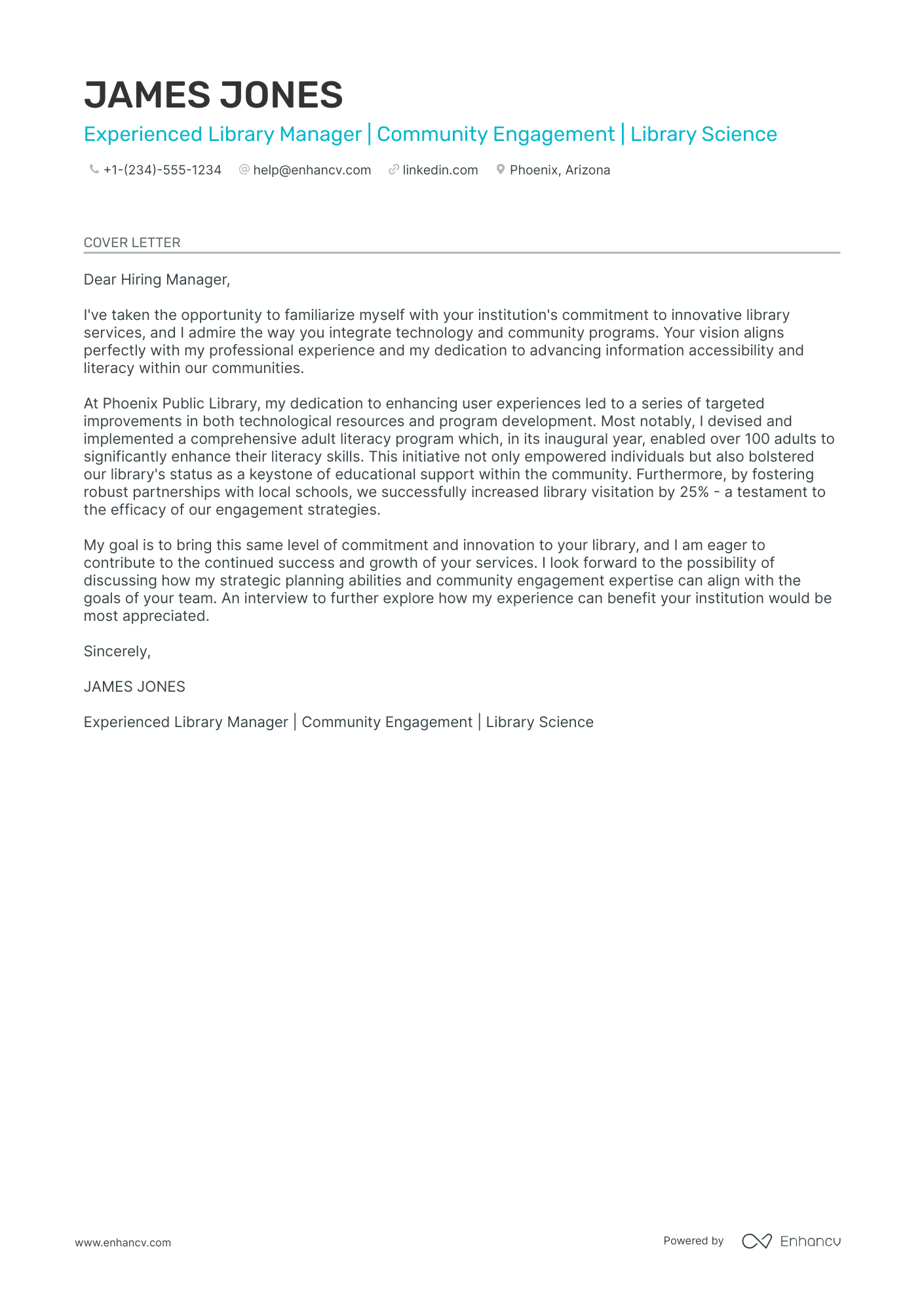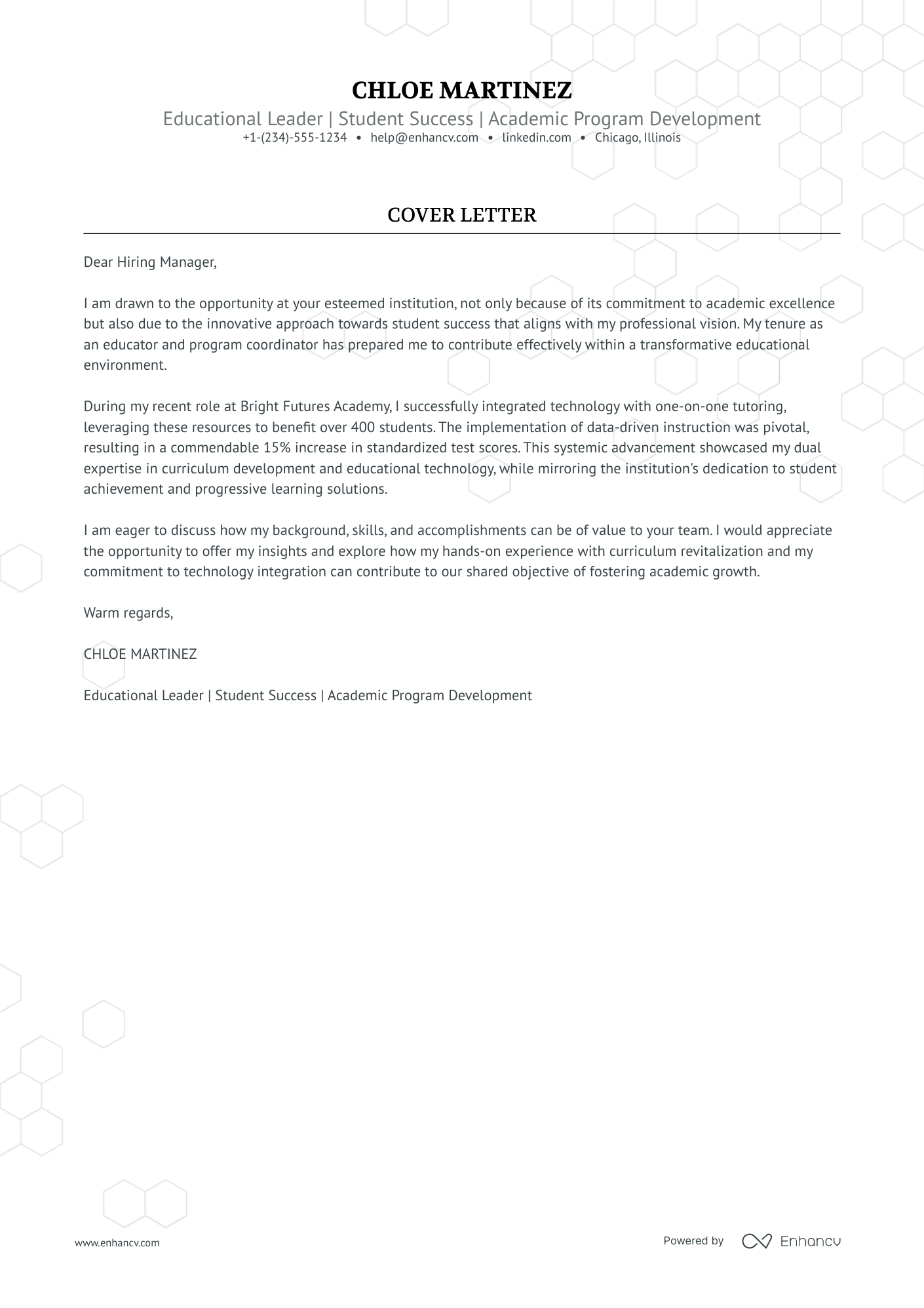Crafting a compelling librarian cover letter can often feel daunting. You might have begun job-hunting, only to realize the crucial role a cover letter plays in your application. It’s not just a repeat of your resume but a narrative of your proudest professional moment. Achieving the right balance between formality and originality, all while avoiding clichés and keeping it to one page, may seem like a tall order. Fear not; we’re here to guide you through creating a cover letter that tells your story effectively.
- Write a librarian cover letter that helps you stand out (and get the job);
- Understand how to start and end your librarian cover letter with the appropriate greeting;
- What to include in the body of your librarian cover letter to put your best foot forward;
- Your most important achievements - how to present them as part of your librarian cover letter.
And if you want to make your life even easier, simply drag and drop your librarian resume into Enhancv's AI cover letter generator, and it will write your cover letter for you in just a few moments.
If the librarian isn't exactly the one you're looking for we have a plethora of cover letter examples for jobs like this one:
- Librarian resume guide and example
- Lead Teacher cover letter example
- Online Teacher cover letter example
- Language Teacher cover letter example
- After School Teacher cover letter example
- Student Ambassador cover letter example
- Student Teacher cover letter example
- Teacher cover letter example
- Correctional Officer cover letter example
- Teacher For Career Change cover letter example
Drop your resume here or choose a file.
PDF & DOCX only. Max 2MB file size.
Librarian cover letter example
Mila Allen
Fort Worth, Texas
+1-(234)-555-1234
help@enhancv.com
- Relevant Experience: The cover letter successfully highlights the candidate's relevant experience by mentioning the digital literacy campaign at the Dallas Public Library, showcasing their ability to adapt and contribute to technological advances within a library setting.
- Quantifiable Achievements: By stating a notable metric, such as the "40% increase in eBook usage," the applicant effectively demonstrates their impact and provides concrete evidence of their accomplishments, which can be especially persuasive to hiring managers.
- Community Engagement: The cover letter emphasizes the candidate’s ability to increase community engagement through strategic program development, as seen with the cultural series event that attracted over 1,000 members, showing they can connect the library with the wider community.
- Alignment with Library Goals: Mentioning their enthusiasm for contributing to the library's commitment to education and digital advancement aligns the candidate's personal goals with those of the Prince William Public Library, indicating a good fit for the institution.
Structuring and formatting your librarian cover letter
Here's what the structure of your librarian cover letter should include:
- Header (with your name, the position you're applying for, and the date);
- Salutation (or greeting);
- Introductory paragraph (or your opening statement);
- Body paragraph (or further proof of your experience);
- Closing paragraph (with a call to action);
- Signature (that is optional).
Use the same font for your librarian resume and cover letter - modern fonts like Lato and Rubik would help you stand out.
Your librarian cover letter should be single-spaced and have a one-inch margins - this format is automatically set up in our cover letter templates and our cover letter builder.
When submitting your cover letter, always ensure it's in PDF, as this format keeps the information intact (and the quality of your document stays the same).
On one final note - the Applicant Tracker System (ATS or the software that is sometimes used to initially assess your application) won't read your librarian cover letter.
Writing a cover letter is easy with our free cover letter generator. Make one in seconds from your resume.
The top sections on a librarian cover letter
- Header: Include your name, address, phone number, email, and the date, which are essential for the recruiter to easily identify and contact you.
- Greeting: Address the hiring manager or committee directly, using "Dear [Name]" if known, to personalize the letter and show that you've done your research on the library.
- Introduction: Clearly state the librarian position you're applying for, your current role, and a brief statement on why you're a strong candidate, to immediately establish your purpose.
- Body: Highlight your relevant experience with library management systems, cataloging, reference services, and community outreach programs, tying your skills to the library's needs to illustrate your fit for the role.
- Closing: Express your enthusiasm for contributing to the library's mission, provide a call to action inviting the recruiter for an interview, and sign off with a professional closing such as "Sincerely," followed by your name, to end the cover letter politely and with intent.
Key qualities recruiters search for in a candidate’s cover letter
- Strong organizational skills - Essential for managing library systems and keeping collections well-organized.
- Passion for literature and knowledge - Demonstrates a genuine interest in the materials and services the library provides.
- Technological proficiency - Necessary for utilizing modern library databases, digital archives, and maintaining computerized checkout systems.
- Customer service orientation - Important for assisting patrons and fostering a welcoming environment for all users.
- Attention to detail - Required for cataloging materials accurately and maintaining meticulous records.
- Experience with community engagement - Shows the ability to develop and implement programs that encourage library use and literacy among different patron groups.
How to greet recruiters in your librarian cover letter salutation
As the saying goes, "You never get a second chance to make a first impression."
Write your librarian cover letter salutation to be more personalized to the actual hiring manager, who is set to assess your profile by:
- greeting them on a first-name basis, if you have previously communicated with them (e.g. "Dear Sam,");
- using their last name, if you have more formal communication or haven't spoken to them (e.g. "Dear Mr. Harrows" or "Dear Ms. Marshall");
- writing "Dear HR Team" or "Dear Hiring Manager", if you have no clue about who's recruiting for the role.
Search on LinkedIn, Google, or the company website to find information as to the recruiter's name.
In any case, avoid the impersonal "Dear Sir or Madam".
List of salutations you can use
- Dear Hiring Manager,
- Dear [Library Name] Search Committee,
- Dear [Library Director's Name],
- Dear Mr./Ms. [Last Name],
- Dear Members of the [Department Name],
- Dear Selection Committee,
The librarian cover letter introduction: focusing on your unique value, with a creative twist
You are not the only one wondering how to start your librarian cover letter. Those first two sentences introduce your profile and should be memorable.
No pressure.
When beginning your librarian cover letter, immediately point out the unique value of working with you. In other words, what you promise to bring to the role by using your past track record of success.
Start your librarian cover letter with a creative twist by telling a joke or stating something relatable. Select this type of introduction only if it aligns with the company culture.
What to write in the body of your librarian cover letter
Now that you've got your intro covered, here comes the heart and soul of your librarian cover letter.
It's time to write the middle or body paragraphs. This is the space where you talk about your relevant talent in terms of hard skills (or technologies) and soft (or people and communication) skills.
Keep in mind that the cover letter has a different purpose from your librarian resume.
Yes, you still have to be able to show recruiters what makes your experience unique (and applicable) to the role.
But, instead of just listing skills, aim to tell a story of your one, greatest accomplishment.
Select your achievement that:
- covers job-crucial skills;
- can be measured with tangible metrics;
- shows you in the best light.
Use the next three to six paragraphs to detail what this success has taught you, and also to sell your profile.
Ending your librarian cover letter to avoid "sincerely yours"
Yes, this sort of closing statement may work best before your signature.
But you want to give recruiters something more with your librarian cover letter ending.
Some professionals choose to go down the path of promises. In a single sentence, they map out what they'd bring about to the role (whether that's a particular technical skill set or personal traits).
Others, decide to be more concrete by thanking recruiters for their time and prompting for their next interview.
Whatever path you choose, remember to always be polite and respectful of the opportunity you've had. Good manners go a long way.
What to write on your librarian cover letter, when you have zero experience
The best advice for candidates, writing their librarian cover letters with no experience, is this - be honest.
If you have no past professional roles in your portfolio, focus recruiters' attention on your strengths - like your unique, transferrable skill set (gained as a result of your whole life), backed up by one key achievement.
Or, maybe you dream big and have huge motivation to join the company. Use your librarian cover letter to describe your career ambition - that one that keeps you up at night, dreaming about your future.
Finally, always ensure you've answered why employers should hire precisely you and how your skills would benefit their organization.
Key takeaways
Within this Enhancv guide, we've provided you with plenty of advice and inspiration on writing your librarian cover letter:
- Always make sure your librarian cover letter is tailored to the role you're applying for to make a good impression on recruiters;
- In your librarian cover letter include a header (with your name, the role you're applying for, date, and contact details) and an introduction of up to two sentences that highlight your key accomplishment or why you'd fit the role;
- Focus your librarian cover letter body on one sole achievement through your career and all the valuable lessons, skills, and know-how you've learned (that are relevant to the role);
- Ensure your librarian cover letter closing statement isn't generic and includes either a call to action or a promise;
- If you lack professional experience, shift recruiters' focus to a relevant achievement (thanks to your academic or versatile experience) or toward your dreams and goals for professional growth.
Librarian cover letter examples
By Role
Library Director
Library Manager
Academic Librarian
- Highlighting specific accomplishments, such as leading initiatives or projects, that showcase leadership and impact in the relevant field, like the digital scholarship initiative.
- Emphasizing relevant skills, such as technological proficiency and resource management, that directly align with the needs of the organization or role.
- Demonstrating commitment to the organization's values or mission, like fostering an innovative learning environment, to show alignment with the institution's goals.
- Expressing a willingness to discuss how one's background and skills can contribute to the success of the organization's ongoing projects, showing eagerness and proactive engagement.
School Librarian
- Highlighting Achievements: Demonstrating the implementation of an interactive digital catalog system and a subsequent increase in student usage showcases the candidate’s proactive approach and effectiveness in utilizing technology to enhance library services.
- Alignment with Institution Goals: Emphasizing the integration of STEM education into library programs connects the candidate’s skills with the educational priorities and curriculum goals of potential employers.
- Professional Experience: The mention of over six years of experience in the specific role builds credibility and assures the employer of the candidate’s expertise and commitment to the field.
- Technology Integration: Highlighting the ability to modernize resource management demonstrates a key skill highly relevant to a school librarian’s role and appeals to institutions seeking to integrate technology in education.
